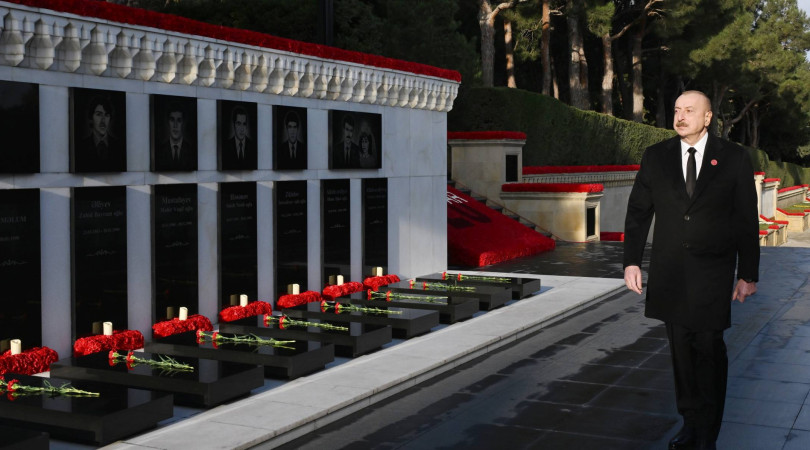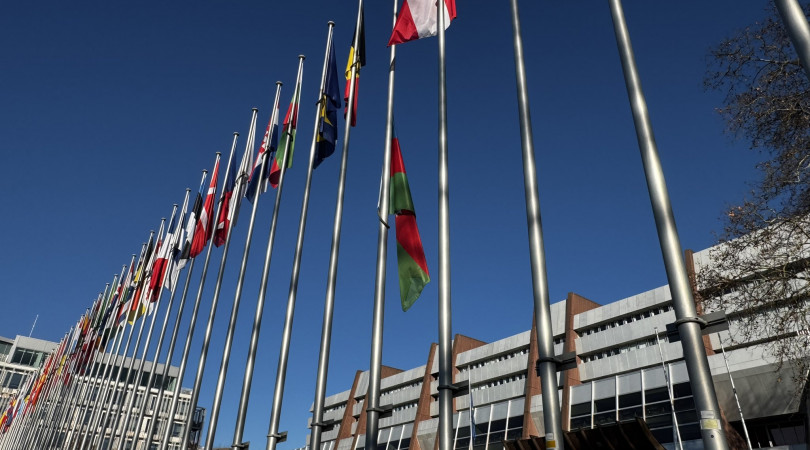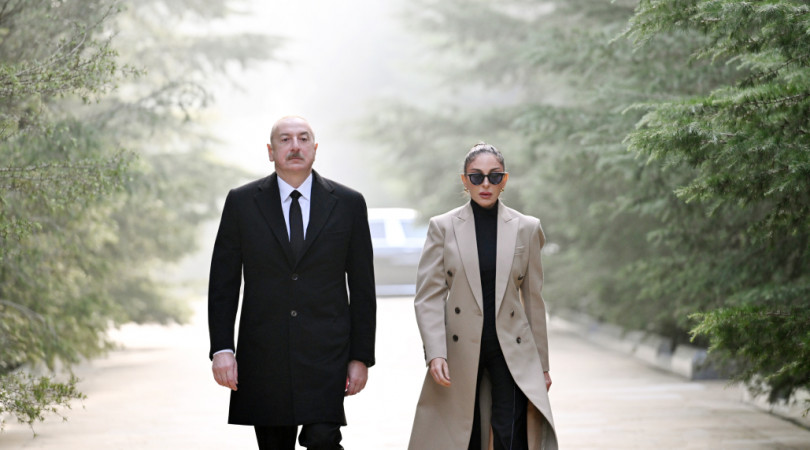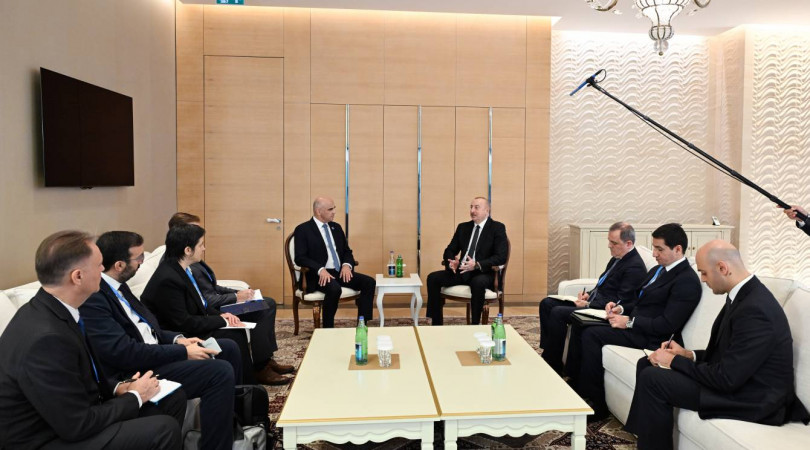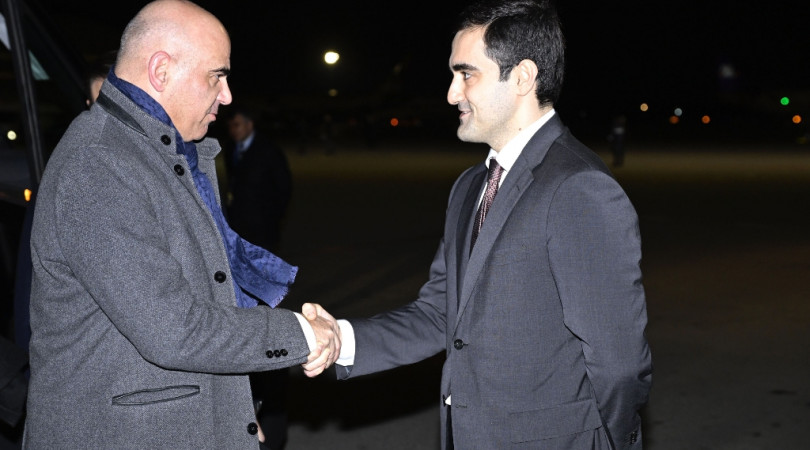Cooperation with the Council of Europe
Council of Europe Action Plan for Azerbaijan 2022-2025
The new Action Plan for Azerbaijan covering the period 2022-2025 was adopted on 16 February 2022 by the Committee of Ministers, and was launched on 5 April 2022 in Baku with the participation of Ms Marija Pejčinović Burić, Secretary General of the Council of Europe and Mr Fikrat Mammadov, Minister of Justice of the Republic of Azerbaijan. This document has been elaborated in a constructive way through extensive consultations between the Secretariat of the Council of Europe and Azerbaijani authorities. It provides a general framework for cooperation in relevant areas identified on the basis of the recommendations and conclusions of numerous bodies of the Council of Europe and the most importantly, the needs of the national stakeholders in Azerbaijan. The present Action Plan covers various areas of Council of Europe’s expertise including, but not limited to, improving implementation of the European Convention on Human Rights, improving the criminal justice system, capacity building for mass media, enhancing information security and personal data protection, increasing the independence and effectiveness of the judiciary, ensuring social rights and etc. In addition, the Action Plan includes new areas of cooperation such as, artificial intelligence, environmental protection, combating trafficking in human beings etc.
The Action Plan builds on the outcomes of the previous Action Plans for Azerbaijan 2014-2017 and 2018-2021, under which developments were reported in areas such as increasing capacities of the judiciary and improving court management; fight against corruption and cybercrime; increasing training capacities of the Justice Academy; improving curricular for the students of journalism; improving management capacities of senior managers and medical staff of prisons and developing youth human rights education.
The Committee of Ministers is responsible, through its Group of Rapporteurs on Democracy (GR-DEM) for the overall assessment of the Action Plan implementation. Progress made under the Action Plan is jointly assessed by the Council of Europe and the Azerbaijani authorities. For this purpose, an Action Plan Steering Committee is established, composed of representatives of the Ministry of Foreign Affairs and other national stakeholders involved in the implementation of the Action Plan as well as of representatives of the Council of Europe.
Partnership for Good Governance (PGG)
Azerbaijan is taking an active part in various projects under Council of Europe/ European Union Partnership for Good Governance (PGG) for Eastern Partnership countries. This co-operation programme aims to strengthen the capacity of Eastern Partnership countries to implement domestic reforms to bring them closer to European standards in the fields of democracy, human rights and the rule of law. The PGG actions, both country-specific and regional, were designed in close consultation with national stakeholders, in the framework of the Council of Europe’s country-specific action plans and the European Union's country-specific annual action programmes. The programme has had two successive phases: PGG I (2015-2018) and PGG II (2019-2021).
In April 2014, the implementation of partnership projects with Eastern Partnership countries (Armenia, Azerbaijan, Belarus, Georgia, Republic of Moldova and Ukraine) in the areas of human rights, democracy and rule of law was agreed between the European Union and the Council of Europe. The European Unionacts as the main donor, whereas the Council of Europe provides the expertise and serves as the key actor in implementation of projects together with beneficiary countries. A number of bilateral and regional projects have been implemented within the framework of this initiative. The PGG Phase I came to an end in 2018.
In the PGG Phase I, a number of regional and bilateral projects related to reforms in the judicial system, combating corruption, cybercrime, awareness-raising activities on human rights, local administration, freedom of expression and media, reforms on penitential service, gender equality, etc. were implemented.
Overall, in addition to 14 regional projects, a total of EUR 4.9 million worth of bilateral projects were also implemented for Azerbaijan:
- The implementation of the European Convention on Human Rights and the precedent law of the European Court of Human Rights in Azerbaijan;
- Improvements in the efficiency and quality of the judicial services in the Republic of Azerbaijan;
- Strengthening the capacity to fight and prevent corruption in Azerbaijan;
- Freedom of expression and media.
Azerbaijan participates at 2 national and 4 regional projects implemented in the framework of PGG Phase II (2019-2021):
National projects:
- Strengthening Anti-Money Laundering in Azerbaijan;
- Strengthening the efficiency and quality of the judicial system in Azerbaijan.
Regional projects:
- Strengthening measures to prevent and combat economic crime;
- Strengthening the access to justice through non-judiciary redress mechanisms for victims of discrimination, hate crime and hate speech in Eastern Partnership countries;
- Women’s Access to Justice: delivering on the Istanbul Convention and the European gender equality standards;
- Strengthening the progression of lawyers with European standards.
Azerbaijan views the PGG as a useful platform for cooperation on sharing of best practices, mutual exchanges, strengthening capacity and consolidating progress in a number of important areas. The results achieved during the first phase of PGG have shown viability and usefulness of this cooperation platform. The activities within the PGG framework correlate well with undertakings within the Action Plan for Azerbaijan thereby serving as an integral element of this important bilateral instrument.
Ensuring Social Rights
Azerbaijan ratified the European Social Charter (revised) on 2 September 2004 to better promote and guarantee social and economic human rights in the country. Azerbaijan has been pursuing constructive dialogue with the European Committee of Social Rights (ECSR) which follows the conformity of the situation in member states with the European Social Charter. Azerbaijan has annually submitted reports on the application of the Revised Charter to the ECSR and received the Committee's recommendations on bringing legislation completely into the same line with the Charter. The measures put forward in the Employment Strategy of the Republic of Azerbaijan for the period of 2006-2015 aimed at ensuring "efficient employment of population through using the labor resources" have been testified the country's dedication to the commitments undertaken by joining the Social Charter.
Fight against corruption
Azerbaijan gives utmost importance to collaboration with the Council of Europe's Group of States against Corruption (GRECO) in fighting and preventing of corruption. Since joining the GRECO in 2004, Azerbaijan has taken a series of legislative and institutional measures to enhance implementation of the GRECO recommendations and relevant international and European anti-corruption instruments adhered by the country. Along with improving legislative and institutional framework, Azerbaijan has also carried out several joint projects with the Council of Europe aimed at increasing practical capacity building of relevant stakeholders.
In 2021, Azerbaijan was amongst eleven Council of Europe Members States, which satisfactorily implemented more than 60% of GRECO Recommendations.
Addendum to the Second Compliance Report on Azerbaijan under the Fourth Evaluation Round was published on 19 May 2021. According to the report, fourteen out of twenty-one recommendations have been implemented satisfactorily, four recommendations have been partly implemented and three recommendations remain not implemented.
In order to strengthen legal framework in fighting against corruption since 1 June 2004 the Republic of Azerbaijan is the party of the Criminal Law Convention on Corruption and the Civil law Convention on Corruption. At the same time, with a view to improving its activities in the above-mentioned spheres since 1 August 2013 the Republic of Azerbaijan became a party of the Additional Protocol to the Criminal law Convention on Corruption.
MONEYVAL
MONEYVAL - the Committee of Experts on the Evaluation of Anti-Money Laundering Measures of the Council of Europe evaluates the effectiveness of domestic measures to counter money laundering and the financing of terrorism in Council of Europe member states. Therefore, constructive work with the MONEYVAL continues being important for the Government of Azerbaijan in order to effectively combat money laundering and the financing of terrorism. Pursuant to the recommendations of the MONEYVAL, the Financial Monitoring Service under the Central Bank of the Republic of Azerbaijan was established in 2009. The Service is authorized to implement the state policy in prevention of legalization of criminally obtained funds and other property and financing of terrorism in the Republic of Azerbaijan, improve the supervision system and coordinate the activity of relevant government authorities. Azerbaijan is a party to the Convention on Laundering, Search, Seizure and Confiscation of the Proceeds from Crime.
Fight against trafficking in human beings
Azerbaijan joined the Council of Europe Convention on Action against Trafficking in Human Beings in 2010. According to the Convention, the Group of Experts on Action against Trafficking in Human Beings (GRETA) has been set up as a responsible body for monitoring the implementation of the Convention by the parties and for drawing up reports evaluating the measures taken by each party. GRETA evaluates the implementation of the Convention following a procedure divided into rounds.
Azerbaijan has already completed the first and second round of monitoring on the implementation of the Convention. The third round of monitoring with a thematic focus on access to justice and effective remedies for victims of trafficking in human beings is expected to begin in 2022.
In 2020, Azerbaijan adopted a new National Action Plan to Combat Human Trafficking for the years of 2020 - 2024. The recommendations of GRETA from the previous evaluation rounds were taken into account in the preparation of this document. The objective of the Action Plan is to ensure the sustainability of measures taken to combat human trafficking, increase the efficiency of interaction between government agencies, ensure the implementation of respective international obligations of the Republic of Azerbaijan and as well as involve civil society actors in this important process.
Cooperation with the European Commission for Democracy through Law (Venice Commission) of the Council of Europe
The history of Azerbaijan's cooperation with the Venice Commission dates back to 1996. Azerbaijan became member of the partial agreement establishing this important body of the Council of Europe in the plenary session of the Commission held on 17-18March 1996. Azerbaijan cooperated with the Venice Commission in improvement of legislation and expertise of important draft laws.
Cooperation in the field of education, culture, youth and gender equality
Cooperation with the Council of Europe in these important areas had started before the accession to the organization with Azerbaijan becoming party to the European Cultural Convention in 1997.
Azerbaijan's cooperation in those fields has been on the rise since the accession in 2001. High level delegations of Azerbaijan have attended number of important ministerial conferences of culture and education. Council of Europe Conference of Ministers responsible for Culture was held in Baku on 2-4 December 2008. The conference entitled “Intercultural dialogue as a basis for peace and sustainable development in Europe and its neighbouring regions” adopted Baku declaration, which launched "Baku Process" envisaging cooperation on intercultural dialogue inside European societies and between Europe and its neighbouring regions. President of the Republic of Azerbaijan H.E. Ilham Aliyev and Council of Europe Secretary General Terry Davis also attended the Conference.
Council of Europe Conference of Ministers responsible for Equality between women and men was held in Baku on 24-25 May 2010. The conference endorsed the resolution and Action Plan.
Baku also hosted 18th Council of Europe informal Conference of Ministers responsible for Sport in September 2010. Conference brought together ministers and other high-ranking officials from 35 parties to the European Cultural Convention. Conference adopted a number of important resolutions, including the resolution on "Promotion of the integrity of sport against the manipulation of results (match-fixing)", "Granting of visas to athletes attending competitions", "Monitoring of the Sport Conventions", "Representation of European public authorities within the World Anti-Doping Agency", "Co-operation between the Council of Europe and the European Union".
Last updated: 16.05.2022

